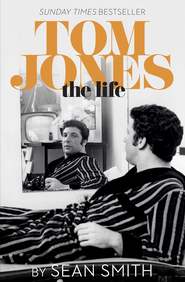По всем вопросам обращайтесь на: info@litportal.ru
(©) 2003-2024.
✖
Spice Girls: The Story of the World’s Greatest Girl Band
Автор
Год написания книги
2019
Настройки чтения
Размер шрифта
Высота строк
Поля
Victoria had a very privileged lifestyle. For her eighteenth-birthday treat her parents arranged for her and Mark to go by Eurostar to stay in Paris. For his twenty-first, Victoria organised a surprise dinner at a West End restaurant and invited his closest friends. They spent their summer holiday at Tony and Jackie’s villa on the Costa del Sol in southern Spain.
Mark was treated as one of the family. He was now living full time at the Old School House – a big step for an eighteen-year-old girl and an even bigger one for her parents. When they got back from Spain, looking fit and tanned, she took Mark along to see Geoff Marchant for some shots, separate and together. This time round, Victoria was much more relaxed. It seemed she had designs on her boyfriend becoming a male model, although Geoff thought he lacked the extra something to make it in that competitive world.
Victoria needed to think about her own career. Despite the very obvious advantage of having wealthy parents, she retained her own personal ambitions. During her last days at Laine’s she started trying out for professional shows and, like her peers, pored over the pages of the Stage for likely auditions. She wasn’t sure if her future lay in pop or musicals.
One advertisement caught her eye but it seemed a little ambitious. She went to a call for Bertie, a new musical starring Anita Harris about the famous music-hall performer Vesta Tilley. Victoria was auditioning to be part of the ‘company’, one of the all-singing, all-dancing members of the chorus. She had continued to develop her image: she had the look (moody), she had the costume (all black), and she had the perfect song to match (‘Mein Herr’). She had decided on the classic song from Cabaret as her principal audition piece; it would prove to be an inspired choice in the future. She liked the song particularly because she felt she could put it across well, a legacy of all the drama classes she had taken over the years. As Joy Spriggs shrewdly observed, ‘She was always very good at drama. She used to do very, very well in all of her exams. I mean, she’s acting all the time, isn’t she really? She’s acting her persona. Yes, she’s role-playing.’
To her delight, she received a phone call at the Old School House saying she had got Bertie. She had just turned nineteen and was technically still at Laine’s so this was a considerable achievement. She would be going into a real show, not killing time on a cruise ship.
Unlike Melanie Brown, who gave up her boyfriend when ambition and Blackpool beckoned, Victoria decided to get engaged. Mark maintained, ‘I knew Toria was the one for me. She was the sweetest girl I had ever met and all I wanted was for her to be my wife.’ His proposal was not a surprise because they had already designed a £1500 engagement ring together. He had also asked Tony for his daughter’s hand in marriage.
He got down on one knee at a romantic candlelit dinner at a restaurant near Tower Bridge and she accepted. Tony and Jackie threw a champagne pool party so that all their friends could celebrate the good news. Everyone seemed genuinely delighted, except perhaps her sister Louise, who had never warmed to Mark.
In her autobiography Learning to Fly, Victoria said, ‘I never for one moment thought that I would marry Mark.’ The engagement seemed to be an acknowledgement that they were in a strong relationship and was one less thing to think about when her career was moving forward. Even though they were not married, she decided to add his name to hers.
All seemed set fair during Bertie’s six-week run at the Alexandra Theatre in Birmingham. Victoria was paid £250 a week, her first real wage, and was looking forward to her West End début. Without warning, the transfer to London was cancelled. It was back to the drawing board, poring over the new issue of the Stage and taking some promotional work handing out leaflets or plugging products. She even worked for the Daily Mirror on promotional visits to newsagents, wearing a T-shirt two sizes too small for her.
In August 1993 she noticed a small ad seeking a girl singer for a new group. This was six months before Chris Herbert’s. She had harboured a secret ambition to break into pop so sent in a CV and a picture of herself dressed in black, naturally, sporting a pair of sunglasses in the manner of her fashion idol Audrey Hepburn. It did the trick and she was called for an audition.
The ad had been placed by Steven Andrews, a professional model from South London, who wanted to be a pop star. Victoria sang ‘Mein Herr’ as usual and also danced to the club hit ‘Let Me Be Your Fantasy’ by Baby D. Steven was impressed – even more so when at a call-back she stood out from a dozen other girls performing the crowd-pleasing classic ‘Band of Gold’ by Freda Payne.
Victoria was hired as lead singer, although, in a precursor for what was to happen later, nothing was signed and there was no immediate prospect of a deal. Twice a week, the new group of three boys and two girls would meet to rehearse. It proved to be an excellent grounding for her future. Steven recalled, ‘She was never late or moody. She just got on with it. Everybody pulled together.’
Steven did think that Victoria lacked confidence in front of the microphone. He was more concerned, however, that the only time she seemed to get upset was when Mark was there, sitting in. He put it down to Mark’s possessiveness and hated him turning up. A clue to Mark and Victoria’s relationship is found in the birthday card she gave him for his twenty-second birthday, which he later revealed to the world. It read, ‘I’ll still love you when you’re old! Lots of love, your Little Pop Star! Victoria xxx’
Considering how Victoria’s abilities were questioned by the media in future years, she was the only one of the future superstars who was actually already the singer in a band when Chris Herbert put the group together. That experience did not mean she was feeling positive during the audition.
She had no idea she was making an impact, although she did notice that girls with what she perceived to be far better voices were picking up their bags and melting away into the Oxford Street afternoon. Her ‘look’ was keeping her in, and the fact that she coped comfortably with the dance steps they were required to do.
After performing ‘Mein Herr’, she packed up to leave and Chris told her he would be in touch. He meant it. She might not have made as big an impression as Melanie Brown had, but she was not far behind.
4
In Search of the Magical Key (#litres_trial_promo)
Back at the office in Lightwater, Chris started to sift through his notes and scoresheets to decide on the best twelve contenders for a second audition. The idea was to have a closer look at the probables and possibles and, obviously, come up with a final five. He couldn’t help noticing that his secretary, Louise, was still fielding calls from a persistent young woman from Watford. To his surprise, they seemed to be building a nice rapport.
Eventually Chris’s curiosity got the better of him and he told her to put the girl through. He soon discovered for himself that Geri Halliwell was a force of nature. She had seen the original advertisement in the Stage and had kept in touch to let them know how keen she was, but on the day she was nowhere to be seen.
Several possible explanations for her absence were volunteered. One was that she had been on a skiing trip and suffered sunburn. Another was that she had needed to make a flying visit to her grandmother in Spain. Chris was impressed by her audacity in keeping her foot in the door. He could see from the photos she sent in that she was sexy without being Hollywood glamorous.
‘She was very bubbly on the phone and we wanted to see her. It didn’t dawn on me at the time but I think she obviously knew she would have failed in an early-round audition and she wanted to bypass that. I think she’d worked that one out and I think that was her strategy.’
Geri almost admitted as much when she said, ‘I didn’t think I would have got an audition because my vocal technique was not very good then.’ If it was her game plan, it paid off because Chris took a chance and invited her to the call-back at Nomis Studios in West London.
Unlike Melanie Brown and Victoria Adams, Geri hadn’t spent half her time as a youngster attending dancing classes. She didn’t have any trophies and cups on the sideboard or framed photographs of her singing sweetly in a stage musical. But somewhere along the line she had developed an overwhelming desire to be famous. Chris noted, ‘She was incredibly hungry for fame.’
Geraldine Halliwell is one of the few women that Kylie Minogue could look in the eye. She is very petite – not much more than an inch or two over five feet. As a child she showed no inclination to grow. Her Spanish-born mother was so concerned at her small offspring that when Geri was nine she took her to see a specialist doctor to find out if she needed medical help. Her Spanish relatives helpfully nicknamed the little girl La Enana which translates as ‘the Dwarf’. It wasn’t exactly an improvement on her earlier pet name, Cacitas, meaning ‘Little Poos’.
Her mother, Ana Maria Hidalgo, was a stunning girl from a village near the historic city of Huesca in north-eastern Spain. She came to London when she was twenty-one to work as an au-pair and fell for the dubious charms of Laurence Halliwell, whom Geri describes as a ‘total rogue’. He was a ‘car-dealer, entrepreneur, womaniser and chancer’.
He spotted Ana in Oxford Street and decided to chat her up. He was forty-four when they married after just a seven-week courtship. He turned out not to be the successful businessman his new wife thought he was, and throughout Geri’s childhood her mother worked as a cleaner to keep the family above the breadline. Laurence had reached the age of fifty when Geraldine Estelle Halliwell was born in the maternity wing of Watford General Hospital on 6 August 1972. They already had a son, Max, five, and a daughter, Natalie, three. The family home throughout Geri’s childhood was in Jubilee Road, Watford, a ten-minute walk to the shops in St Albans Road.
The three-bedroom semi-detached house was in a sombre street in a poorer area of the town but there’s a world of difference between this part of Watford and the grim and dangerous sink estates of the north of England. Geri was a happy and outgoing child, who, as the youngest, was more than a little spoilt. She was also prone to telling little white lies, something she was still apt to do when drumming up publicity as an ambitious performer. Her one-time claim that her mum had aristocratic ancestry was just one of her good-natured fibs.
She shared a room with her big sister, who, for the most part, acted as a protector, although they were only at junior school together. They weren’t alike – Geri was far more extrovert – but they developed a strong bond that completely survived fame. Geri rather sweetly said that she was Natalie’s ‘little shadow’.
Her mum had been brought up a Catholic but was a Jehovah’s Witness throughout most of her daughter’s early years, which meant that they didn’t celebrate birthdays or Christmas or have Easter eggs. She used to take Geri with her from door to door, much to her daughter’s embarrassment. Geri had to listen to her mother cold-calling in the hope of persuading people, in her broken English, to join the faith or that the end was near. At other times she would sit next to her mum at meetings in the local Kingdom Hall and listen to Bible stories. She was delighted when Ana Maria decided it was no longer the belief for her.
Quite often in the school holidays Geri would have to go with her mum to the places she was cleaning because there was no one else to look after her. Even at a very young age she sensed the hardship her mum faced every day, trying to bring up her children properly. She learnt the value of money early, first by helping her sister with her paper round and then by starting her own when she was seven. She had already decided when she was six years old that fame was the best way to a better life for herself and her family. She described it in her book If Only as a ‘magical key’.
Apparently her inspiration as a little girl was watching Margaret Thatcher at the door of 10 Downing Street on her first day as prime minister. She watched it with her dad, who was a ‘true blue Tory’. She loved him dearly, even though he contributed little to the household. He always encouraged his little girl to give everyone a song when they were at home after Sunday lunch.
Occasionally, he would restore an old car and sell it on but he didn’t do much after a road accident left him with a bad hip when Geri was a child. He loved old movies, which he would watch on the telly, sometimes with his youngest daughter, while his long-suffering wife was at work. Geri grew up better acquainted with beautiful Hollywood greats, like Marlene Dietrich and Rita Hayworth, than with the latest chart acts. These were the stars she would pretend to be in front of the mirror with a hairbrush. Her favourite film was the romantic blockbuster Gone with the Wind starring Clark Gable and Vivien Leigh as Rhett Butler and Scarlett O’Hara. Geri vowed that one day she, too, would own a splendid mansion just like the Tara plantation house.
Laurence was distinctly old-fashioned in his musical tastes, and the house in Jubilee Road was filled with the sounds of Frank Sinatra and Benny Goodman. Geri observed, ‘It’s probably something to do with having an older father. I’ve always been different from my age group in liking that kind of music.’ He would often be mistaken for her grandfather when they were out and about.
Although she was devoted to her dad, her mum remained her role model, constantly displaying a determination to get things done. She was quite strict with Geri, which led to some mother-daughter tensions while Geri was growing up. Ana Maria didn’t support her plan to sign with a child agent, for instance, telling her she needed to think more sensibly about her future and plan a solid career.
Her parents eventually split when Geri was nine and she went to stay with her half-sister, Karen, who was Laurence’s grown-up daughter from his first marriage. After everything was sorted, she moved back to Jubilee Road while her dad settled into a grotty flat in a high-rise council block in a rougher area of the town, close to the M1. Once a week, Geri would go round to clean the place and make sure there was some milk in the fridge.
After she and Laurence divorced, Ana Maria found a new long-term boyfriend but she was always there to support Geri, if asked. Over the years she realised that trying to rein in her headstrong daughter was a thankless task. Those who came across her, when Geri had fulfilled her dream of fame, remarked that she had no airs and graces. Her future manager, Jon Fowler, observed, ‘Her mum was absolutely terrific. She was very respectful and modest – and always smiling.’
Not all her contemporaries at the Walter de Merton Junior School in Gammon Lane warmed to Geraldine, as her mother always called her, or Jez, as she liked to call herself for a while. One classmate described her as a ‘show-off with a big mouth’. Another threatened to throw her over the railway line until a teacher intervened. Others, though, found her sociable and fun – a natural leader who would bring out the best in everyone.
One of her close friends at the school, Sarah Gorman, recalled that they would go round to each other’s houses for tea and used to play kiss-chase with the boys in the playground.
Despite her small stature, Geri was a demon on the netball court and used to play centre because she was so nimble and nippy. She retained a strong affection for her junior school and returned there in 2008 to read to pupils from the first of her Ugenia Lavender books for children: ‘I felt more nervous reading than I ever did performing as the Spice Girls.’ She even included one of her favourite teachers, Mrs Flitt, as a character in the book.
Even though Walter de Merton had become Beechfield School, it still retained a strong link with its famous former pupil and one of the houses is called Halliwell House.
Before she left junior school, Geri went to her first concert when she joined Natalie to see Wham! on the Big Tour at the NEC, Birmingham, in December 1984. George Michael was performing the number-one single ‘Freedom’ and when he got to the last line, he pointed at Geri and sang, ‘Girl, all I want right now is you.’ She fell in love and decided on the spot that they were going to get married. Every night she would give a poster of him on her bedroom wall a goodnight kiss before getting into bed. Many of her classmates fancied Andrew Ridgeley and would gather outside his parents’ house a couple of miles away in Bushey but Geri’s heart always belonged to George.
Her devotion to George also coincided with her discovery of Madonna, whose flamboyant image would be a considerable influence on her. Even as a young teenager she could identify with the artist who had become the most famous woman in pop, even though she was by no means the best singer or dancer. Instead she had a fantastic image.
After Walter de Merton, Geri was expected to follow her brother and sister to the nearby Leggatts Way Secondary Modern but she had other ideas. She asked her mum if she could try for a place at Watford Grammar School for Girls and surprised everyone by being accepted. It was an early indication that Geraldine Halliwell was someone who could make things happen.
The one drawback was that she lost touch with most of her primary-school classmates, but Geri’s lack of shyness ensured she made friends easily. The new school also gave her the opportunity to discover drama. Growing up, there had been no money for dance classes or music lessons so the highlight of her performance career to date was pretending to be Sandy from Grease and singing ‘Summer Nights’ in assembly at junior school.
Now, she was being encouraged to appreciate Shakespeare, and a trip to watch A Midsummer Night’s Dream at the Open Air Theatre in Regent’s Park was one of the highlights of her time at Watford Grammar. The school was one of the best in the area: founded in 1704 as a charity school, it had an excellent academic reputation.
Geri passed an impressive eight GCSEs, without particularly applying herself. She had no desire to continue a formal education by going on to study for A-levels, Instead she decided to follow her sister Natalie and go to the local Casio College in Langley Road, Watford, which Andrew Ridgeley had attended a few years before. If she had been a bit older Geri might have seen him and George Michael perform there with their original band, the Executive.
Geri studied a curious mixture of finance, travel and tourism, which didn’t suit her. She decided that she was just wasting precious time, promptly left and started dancing. She had no proper training so would just improvise and hope for the best. She had developed a curvaceous figure and was soon noticed around the London clubs. She was paid £40 for dancing on a Saturday night – and Sunday morning – at the Crazy Club and the house-music extravaganzas held at the Astoria in Charing Cross Road.
Geri moved out of Jubilee Road, staying for a while in a terraced house owned by her half-sister Karen and her husband in the Watford suburb of South Oxhey. She had to leave after she had invited everyone in the Game Bird pub to a party at the house. Word got round: two hundred people turned up and wrecked the place. Shamefaced, Geri moved into a squat on a nearby council estate.
Newly independent, Geri had to buy her own food. This was not necessarily a good thing because she was worrying for the first time about her weight. As a result, she did something she later claimed was ‘the biggest mistake of my life’ – she went on a diet. The trigger had been a throwaway remark by one of her fellow dancers about her being a bit plump. She had been a fussy eater as a child – avoiding vegetables if she could – but at least then her mum, who could be quite strict, could keep an eye on her. Left to her own devices she wasn’t eating properly at all.










